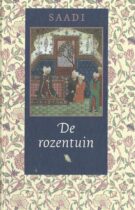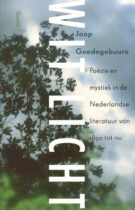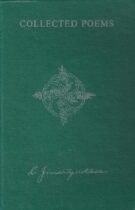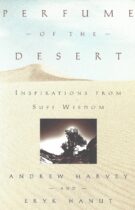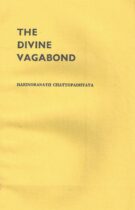Gitanjali – Een Offerande van Liederen
Door Rabindranath Tagore, (1861-1941) vertaald door Jogchum Dijkstra.
104 Pagina’s | 2006 | Paperback | Discovery Books, Leeuwarden | ISBN: 9077728074.
Rabindranath Tagore was een Indiase dichter en wijsgeer. Hij werd in Calcutta geboren uit een voorname Brahmanenfamilie en was een voorvechter van sociale en politieke hervormingen in India. Hij schreef vele wijsgerige en lyrische religieuze geschriften. Het boek Gitanjali is zijn bekendste werk. In 1912 verscheen hiervan een door Tagore zelf vertaalde Engelse versie. Een jaar later kreeg hij hiervoor de Nobel prijs.
Gitanjali is een offerande van liederen voor de Schepper. In deze liederen weerklinken zijn diepe religieuze gevoelens en zijn liefde voor de natuur en de mensen. Tagore gebruikt vele beelden uit de Indiase liefdesgedichten om zijn verlangen naar God te verwoorden. Het alledaagse krijgt in zijn offerande van liederen een mystieke diepte, doordat hij het lage en gewone gebruikt om zijn zoeken naar het hoge en bijzondere uit te drukken. Zodat Tagore in lied 43 kan zeggen: De stappen die ik op een dag in mijn speelkamer hoorde, zijn dezelfde die weerklinken van ster tot ster.
De Hovenier
Door Rabindranath Tagore (1861 – 1941), vertaling door Frederik van Eeden.
85 Pagina’s | 2018 | Paperback | Uitgeverij Calbona, Amsterdam | ISBN: 9789492954329.
Rabindranath Tagore is een Indiaas schrijver, dichter, mysticus. Hij wordt in India op handen gedragen en men zou kunnen zeggen, dat hij in zich de essentie van de Indiase cultuur draagt; een cultuut die essentieel religieus is en als het ware communiceert met een andere, verborgen werkelijkheid.
Hij ontving de Nobelprijs voor literatuur in 1913.
Geetanjali
Door Rabindranath Tagore (1861 – 1941), vertaling door Arthur Kooyman.
172 Pagina’s | 2017, eerste druk | Hardcover | SA Uitgeverij, Amsterdam | ISBN: 9789076389257.
Geetanjali is een intens mystiek gedicht over het vermoeden van God en diens aankomst en hoe de dichter met het Godsbegrip omgaat. Het werk werd oorspronkelijk in het Bengalees geschreven, maar werd door Tagore zelf in het Engels vertaald. Het dichtwerk bestaat uit een honderdtal kleinere strofen die nu voor het eerst in het Nederlands vertaald zijn als metrisch gedicht.
Tagore heeft veel geschreven, werken die men als wijsheidsliteratuur kan opvatten, andere werken, maar nergens wordt de essentie van de cultuur van India en de geest van de mystieke dichter zo treffend vertolkt als in het dichtwerk ‘Geetanjali‘, een dichtwerk dat zelf weer uit kleinere strofen bestaat.
De Wassende Maan
Door Rabindranath Tagore (1861 – 1941), vertaling door Liesbeth Meyer.
82 Pagina’s | 2007 | Hardcover | SA Uitgeverij, Amsterdam | ISBN: 9789076389141.
De Wassende Maan werd het tweede werkje, na Geetanjali, waarmee Europa kennis kon maken met Tagore. Het werd bestempeld als kinderproza, geschreven rond het begin vande twintigste eeuw, een periode gekenmerkt door persoonlijk verlies.
De benaming kinderproza is in feite niet helemaal op zijn plaats; veel meer is het proza die een wijsheid omvat die iedere volwassene zal aanspreken. Het weerspiegelt een eenvoud van ongekende waarde.
De Rozentuin
Door Saadi (ca. 1212-1295), uit het Perzisch vertaald door J.T.P. de Bruijn.
271 Pagina’s | 5e druk, 2020 | Uitgeverij Bulaaq, Amsterdam | ISBN: 9789054600541
Oorspronkelijke titel: Golestaan
De Rozentuin is een onbetwist hoogtepunt in de klassieke Perzische literatuur. Het is een prozawerk met vele korte gedichten, zodat het ook tot de poëzie kan worden gerekend. Het gaat over machtigen en rijken tegenover onderdrukten, over oprechtheid tegenover veinzerij, over mystiek, erotiek en morele waarden.
Saadi (ca. 1212-1295) was zowel mysticus als hoveling, maar bovenal dichter. Na zijn opleiding in Bagdad reisde hij rond in de islamitische wereld. Zijn boek geeft weer wat hij leerde over vorsten en bedelmonniken, hovelingen en krijgslieden, kooplieden en pelgrims.
De Rozentuin was het eerste literaire werk uit Perzië dat in Europa bekend werd. In 1654 verscheen er een Nederlandse vertaling via het Duits, later hebben Bilderdijk en Leopold er fragmenten van vertaald. Saadi wordt – niet alleen door de Perzen – bewonderd om zijn puntige stijl en nuchtere wijsheid.
J.T.P. de Bruijn (1931) studeerde Arabisch, Perzisch en Turks en was tot voor kort hoogleraar Perzich te Leiden. Van zijn hand verscheen Een karavaan uit Perzië, een omvangrijke en geroemde bloemlezing klassieke Perzische poëzie. (Bulaaq, 2002)
Wit Licht – Poëzie en Mystiek in de Nederlandse Literatuur van 1890 tot Nu.
Door Jaap Goedegebuure.
256 Pagina’s | Uitgegeven in 2015 | Softcover | Uitgeverij Vantilt, Nijmegen | ISBN: 9789460042348.
In het spreken en schrijven over de mystieke ervaring komen twee begrippen telkens terug: licht en donker. Het pad naar het verlossende inzicht gaat door de duistere nacht en wie uiteindelijk ziende wordt, moet eerst blind zijn geweest. Dat geldt voor Paulus, voorganger en rolmodel van alle christelijke mystici, maar ook voor Dante die na een dwaaltocht door een donker woud en een afdaling in de hel mocht opgaan naar het van licht doorstraalde paradijs.
‘Licht’ is het sleutelwoord in het werk van Nederlandstalige dichters die Jaap Goedegebuure in dit boek bijeengebracht heeft. Herman Gorters extatische verzen zijn ingegeven door een ware lichtdronkenschap, Bertus Swaanswijk koos het pseudonym Lucebert om aan te geven dat hij de grauwe Hollandse atmosfeer wilde laten verdampen in de hitte van zijn bliksemende gedichten. ‘Het licht, Gods witte licht breekt zich in kleuren‘, schreef Nijhoff, daarmee en metafoor scheppend voor de tegenstelling tussen de buitenaardse werkelijkheid waarin de mystici willen opgaan en het gefragmenteerde bestaan waarmee ze het moeten doen. Goedegebuure laat het witte licht breken in een bont gezelschap dat christenen, agnosten, atheïsten, moslims, Indiagangers en zen-adepten omvat.
Afkomstig uit Hoofdstuk 2 – ‘Een Wonder uit Zielegrond – Mystieke Tendensen in het Symbolisme’ (p. 49 & 50):
” Als onwisselbaren schat
Draagt de ziel heur rijk gemis
Door de bonte wildernis
Van de groote menschenstad:
Heel de volheid van haar hart,
Nardus in zijn broos albast –
O te liefelijken last
Voor dees markt van vreugd en smart! “
For a Wayfarer
Poems by Joy Mills (1920 – 2015).
182 Pages | First Quest Edition 2017 | Softcover | Quest Books, U.S.A. | ISBN: 9780835609432.
Joy Mills, past president of the American and Australian Theosophical Societies, received the Subba Row Medal from the Society’s General Council in 2010, honoring her major contribution to Theosophical literature. Joy’s poems in this collection were found after her passing. Written over decades, they reveal a love for nature, a keen understanding of life’s complexities, and a deep spiritual Wisdom.
From the front cover:
And Unto Us
” Some-soon upon a high
Far distant hill
Beneath the Sky
We shall find
The fragments of a faith
Lost time out of mind.
‘And unto us . . .’ shall be,
Familiars of the Stars,
The dawning of Infinity. “
Collected Poems
By Curuppumullage Jinarājadāsa (1875–1953).
122 Pages | Published in 1953 | Hardcover | Theosophical Publishing House, Adyar | No ISBN.
Selected and arranged by E.N.
This Volume of Poems by Jinarājadāsa is presented in fulfilment of a verbal promise made to him in 1949, further enjoined by a clause is his last Will, to the effect that after his death there should be published certain poems written in notebooks carefully preserved by him from 1909, when he first adopted the poetic method for giving expression to his feelings, thoughts and aspirations. Not many of these have previously appeared in print, although from time to time he has quoted a number to illustrate some point in a lecture or a book, and has on several occasions given readings from this poems to Theosophical audiences. I am indebted to the Manager of the Theosophical Publishing House, Adyar Madras, for permission to reproduce here a few poems which have already appeared in one or two of the author’s prose works.
From Page 3:
LACRIMAE RERUM
(To ‘Little Flower’)” This I see – that Nature is but a glass
Before which Form and Formless transient pass.
This I think – that a Hand unseen but kind,
To joys of Life my tranced eyes unbind.
This I feel – that life is a darkened room,
Where yearning I fulfil a weary doom.
This I know – that in inmost heart I cry
From life’s oppressive shadow-show to fly.
For this I AM: my flower-heart unfurled,
Turns to a Sun not of this shadow-world.
And so I cull the perfume of each thing,
And to you, dearest Shadow, tearful bring. “
France, 1913.
Perfume of the Desert – Inspirations from Sufi Wisdom
By Andrew Harvey and Eryk Hanut.
170 Pages | First Quest Edition 1999 | Softcover | Quest Books, U.S.A. | ISBN: 0835607674.
‘Before any garden or grape or wine existed, our Soul was drunk on eternal wine’. – Rumi.
Intoxicate your Soul with Harvey’s & Hanut’s favourite Sufi teaching stories, sayings and ecstatic poetry, featuring new translations of Rumi. In the hope of awakening the sacred heart in all of us and infusing its passion into all the choices of life, this anthology has been created. Only those poems, stories or philosophical fragments are included, that have directly inspired the authors. They wanted each section to ‘smell of the desert’ and to inebriate with its fragrance. Sufi talk or instruction is never linear; Sufi poets and sheikhs will try almost anything to shock their listeners awake, will swerve from the highest philosophy to the fragment of a great ode of Hafiz or Rumi, to a story in yesterday’s newspaper, to a joke from Nasrudin.
From Chapter ‘The Inner Secret’; (p. 64):
THE SWING
” Between the posts of ‘conscious’ and ‘unconscious’
The mind has strung a swing:
On it bang all beings, all worlds
And it never stops swaying.
Millions of beings sit on it
And the sun and the moon also.
Millions of eras come and go
But the swing remains.
Everything swings!
Sky and earth, air and water
And the Beloved Himself
As He comes into form –
Seeing this
Has made Kabir a servant. “
– Kabir.
Poems
By Clara Margaret Codd (1876 – 1971) and Dorothy Codd.
76 Pages | Published in 1964 | Softcover| Theosophical Publishing House, Adyar | No ISBN.
This little work consists of a selection of poems written by the sisters Codd.
From page 1 & 2:
To The God In My Heart
” Ah! Thou most beautiful,
Mysterious, pure,
And high above my Soul as life and death,
Whence comest thou?
Dear God! Dear God!Ah! Thou strange visitant,
And yet not strange,
My soul cries for Thee through the veil which
. . . shades
My clearer sight,
And loves, loves, loves.Whence comes that wondrous world,
Still, far, and sweet,
Which opens to my soul, and makes my heart
Stand still, forget
She lives, she beats?Ah! I have lived so long,
Eternities!
Such long, long years surge in my memory,
Such years and years
Of long-dead sweets.So, then. within the circle of these arms,
As though a cross upheld through all the worlds;
So, then, within the boundary of his heart,
Grown greater than the seas, and deep as hell;
Come thou, O world, I that have ache of thee,
And pity that shall fill a thousand years
For every tear of thine! And thee, thou soul
Amongst all other souls so well-beloved,
If thou hast will to come –Aye! If thou art blind, and know not –
Little one, come! “
The Divine Vagabond
By Harindranath Chattophadyaya (1898 – 1990) with a Foreword by Curuppumullage Jinarājadāsa (1875–1953).
Chattopadyaya 135 Pages | Published on Sept. 2nd 1950 | Softcover | Theosophical Publishing House, Adyar | No ISBN.
From the Foreword:
For over half a century the poetry of England and the United States has been balefully influenced by the prevailing materialism of our age. They remind me of our Indian ants, who bite the yellow rind only and never penetrate into the sweet pulp. The Poetry of today with its rhythms and imageries appeals mainly to the mind. Not that they are not exquisite in their way; they can certainly do give delight. Yet nevertheless, it can be said of these poets:
‘Tis ye, ’tis your estrang-ed faces,
That miss the many-splendoured thing’.
Of course here and there are a few exceptions like Alice Meynell, Francis Thompson, A.E. Yeats, Cousins and a few others. But in the main, I who love poetry greatly, have felt a profound dissatisfaction with the poems I have read.
From the Prelude:
” I AM a vagabond, but never ask me
From where I came.
I only know that I came like a shadow,
I’ll pass like a flame.
Every man that you meet on the roadway
And in the street,
Without his knowing hides a great vagabond’s
Tune in his feet.
What is the sun but a vagabond’s laughter?
What are the stars but a vagabond’s tears?
And the wide world is a wandering vagabond
Looking for some one through the long years. “
 Bezig met bijwerken…
Bezig met bijwerken…



